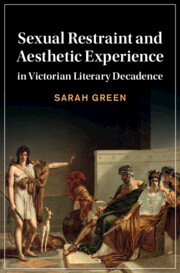Book contents
- Sexual Restraint and Aesthetic Experience in Victorian Literary Decadence
- Cambridge Studies in Nineteenth-Century Literature and Culture
- Sexual Restraint and Aesthetic Experience in Victorian Literary Decadence
- Copyright page
- Contents
- Acknowledgements
- Introduction
- 1 Loss and Gain
- 2 ‘A Passionate Coldness’
- 3 ‘A Holy Indifference and Tolerant Favour’
- 4 ‘An Ascetic Epicureanism’
- 5 ‘Men Have Died of Love’
- Conclusion
- Notes
- Bibliography
- Index
- Cambridge Studies in Nineteenth-Century
4 - ‘An Ascetic Epicureanism’
Vernon Lee
Published online by Cambridge University Press: 02 March 2023
- Sexual Restraint and Aesthetic Experience in Victorian Literary Decadence
- Cambridge Studies in Nineteenth-Century Literature and Culture
- Sexual Restraint and Aesthetic Experience in Victorian Literary Decadence
- Copyright page
- Contents
- Acknowledgements
- Introduction
- 1 Loss and Gain
- 2 ‘A Passionate Coldness’
- 3 ‘A Holy Indifference and Tolerant Favour’
- 4 ‘An Ascetic Epicureanism’
- 5 ‘Men Have Died of Love’
- Conclusion
- Notes
- Bibliography
- Index
- Cambridge Studies in Nineteenth-Century
Summary
What can a model of continence based in male physiology have to offer female writers? This chapter argues that the strong opinions that Vernon Lee expressed about sex and its relation to art in her early writing should not be dismissed as the result of repression or parental indoctrination, as they have been by previous critics. Lee, like Johnson, combined Paterian sensuous continence with other nineteenth-century discourses, particularly discussions of sexual health by New Women writers, and the result is central to her theorizing about life, social ethics, and art. She insisted on the harmfulness of sex to both individuals and society, and that those who felt otherwise were suffering from ‘logical misconception’. But Lee was also an aesthete, for whom sensuous experience was extremely important. She worried that continent aestheticism would limit an aesthete’s experience and lead to solipsism and waste. Her answer was a Paterian disciplined love, a reaching out to what is unhealthy and corrupt, whether people, places, or artworks, and learning to filter the good from the bad, to ‘cleanse and recreate it in the fire of intellectual and almost abstract passion’.
- Type
- Chapter
- Information
- Publisher: Cambridge University PressPrint publication year: 2023

